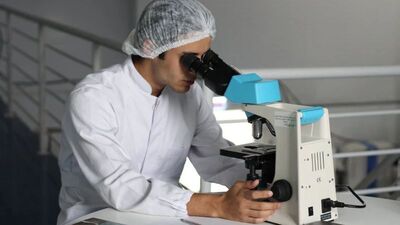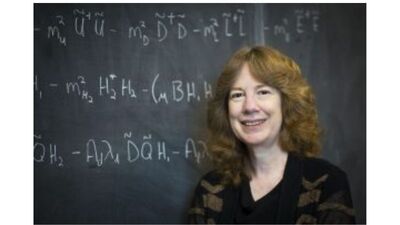Latest News
E&C Republicans Press CDC for Information Related to Reorganization Plan
By DOE Newswire | May 6, 2023
News Release: Washington, D.C. - House Energy and Commerce Committee Chair Cathy McMorris Rodgers (R-WA), Subcommittee on Health Chair Brett Guthrie (R-KY), and Subcommittee on Oversight and Investigations Chair Morgan Griffith (R-VA) today sent a letter to Centers for Disease Control and Prevention (CDC) Director...
E&C Republicans Press CDC for Information Related to Reorganization Plan
By DOE Newswire | May 6, 2023
News Release: Washington, D.C. - House Energy and Commerce Committee Chair Cathy McMorris Rodgers (R-WA), Subcommittee on Health Chair Brett Guthrie (R-KY), and Subcommittee on Oversight and Investigations Chair Morgan Griffith (R-VA) today sent a letter to Centers for Disease Control and Prevention (CDC) Director...
To Track Turbulence in Tokamaks, Researchers Turn to Machine Learning
By DOE Newswire Report | May 6, 2023
Understanding the turbulence in the boundary of magnetically confined plasma in a tokamak device is fundamental in fusion research.
Zeroing in on a Fundamental Property of the Proton’s Internal Dynamics
By DOE Newswire Report | May 6, 2023
Inside the proton are elementary particles called quarks.
Predicting Changes in Microbial Food Webs
By DOE Newswire Report | May 6, 2023
Increasing either temperature or nutrients can hurt ecosystems by destabilizing food webs, which are all of the interconnected food chains that make communities behave the way they do.
Controlling Materials Properties Through Nanoscale Patterning
By DOE Newswire Report | May 6, 2023
Scientists have developed a new way to control the electronic properties of materials.
Understanding the Origin of Matter with the CUORE Experiment
By DOE Newswire Report | May 6, 2023
There is so much that we do not yet know about neutrinos.
Getting Purer Berkelium, Faster than Ever
By DOE Newswire Report | May 6, 2023
Researchers need a better way to extract individual heavy metal elements, called actinides, to obtain a purer product. In 2018, researchers discovered that the actinide berkelium, when oxidized, does not form negatively charged ions in solutions of high nitric acid, as other actinides do.
Deep Learning-Drives Insights into Protein-Protein Interactions
By DOE Newswire Report | May 6, 2023
Protein sequencing allows scientists to identify the amino acids in a protein.
Nucleons in Heavy Ion Collisions Are Half as Big as Previously Expected
By DOE Newswire Report | May 6, 2023
To study atomic nuclei and subatomic particles, scientists use the Large Hadron Collider (LHC) to collide heavy ions—atomic nuclei completely stripped of their surrounding electrons.
First Science Results from FRIB Published
By DOE Newswire Report | May 6, 2023
A multi-institutional team of nuclear science researchers has published the results of the first experiment at the Facility for Rare Isotope Beams (FRIB).
Department of Energy to Support 999 Outstanding Undergraduate Students and 79 Faculty Members from Institutions Underrepresented in the Scientific Research Enterprise
By DOE Newswire Report | May 6, 2023
The Department of Energy’s (DOE’s) Office of Science will sponsor the participation of 999 undergraduate students and 79 faculty members in three STEM-focused workforce development programs at 16 DOE national laboratories and a national fusion facility during summer 2023.
DOE’s Office of Science Graduate Student Research (SCGSR) Program Selects 87 Outstanding U.S. Graduate Students
By DOE Newswire Report | May 6, 2023
The Department of Energy’s (DOE’s) Office of Science has selected 87 graduate students representing 33 states for the Office of Science Graduate Student Research (SCGSR) program’s 2022 Solicitation 2 cycle.
2023 Frib Visiting Scholar Program For Experimental Science Names Award Winners
By DOE Newswire Report | May 6, 2023
Moshe Friedman from the Hebrew University of Jerusalem in Israel, AJ Mitchell from the Australian National University in Australia, and Shuya Ota from Brookhaven National Laboratory are the award recipients for the 2023 Facility for Rare Isotope Beams (FRIB) Visiting Scholar Program for Experimental Science.
Researchers team up with national lab for innovative look at copper reactions
By DOE Newswire Report | May 6, 2023
Researchers at Binghamton University partnered with the Center for Functional Nanomaterials (CFN) — a U.S. Department of Energy Office of Science User Facility at Brookhaven National Laboratory
Brookhaven National Laboratory’s New Director JoAnne Hewett To Join Stony Brook Faculty
By DOE Newswire Report | May 6, 2023
The United States Department of Energy’s (DOE) Brookhaven National Laboratory’s (BNL) newly appointed director, theoretical physicist JoAnne Hewett, will be joining Stony Brook University as a tenured faculty member in the Department of Physics and Astronomy and the C.N. Yang Institute for Theoretical Physics. Hewett is the first female director to lead BNL.
IU researchers part of collaborative project to better understand the physics of our universe
By DOE Newswire Report | May 6, 2023
The Majorana Demonstrator experiment took place in the Sanford Underground Research Facility in the Black Hills of South Dakota.
New materials research at CU Boulder will help develop high-efficiency solar cells
By DOE Newswire Report | May 6, 2023
Researchers in the Department of Chemical and Biological Engineering and the Materials Science and Engineering Program have published new findings in Joule that could lead to the development of better hybrid lead halide perovskites – a class of materials proposed for use as low-cost, high-efficiency solar cells.
US forests face an unclear future with climate change
By DOE Newswire Report | May 6, 2023
When you walk through a forest, you are surrounded by carbon. Every branch and every leaf, every inch of trunk and every tendril of unseen root contains carbon pulled from the atmosphere through photosynthesis.
Engineering Cyanobacteria for cross-cultural exchange
By DOE Newswire Report | May 6, 2023
Cyanobacteria, photosynthetic microorganisms which have widespread uses in the production of pigments, antioxidants and supplements and potential ones in biofuels and plastics, have a new way to communicate to control their population, researchers from the MSU-DOE Plant Research Laboratory (PRL) Ducat lab show.















